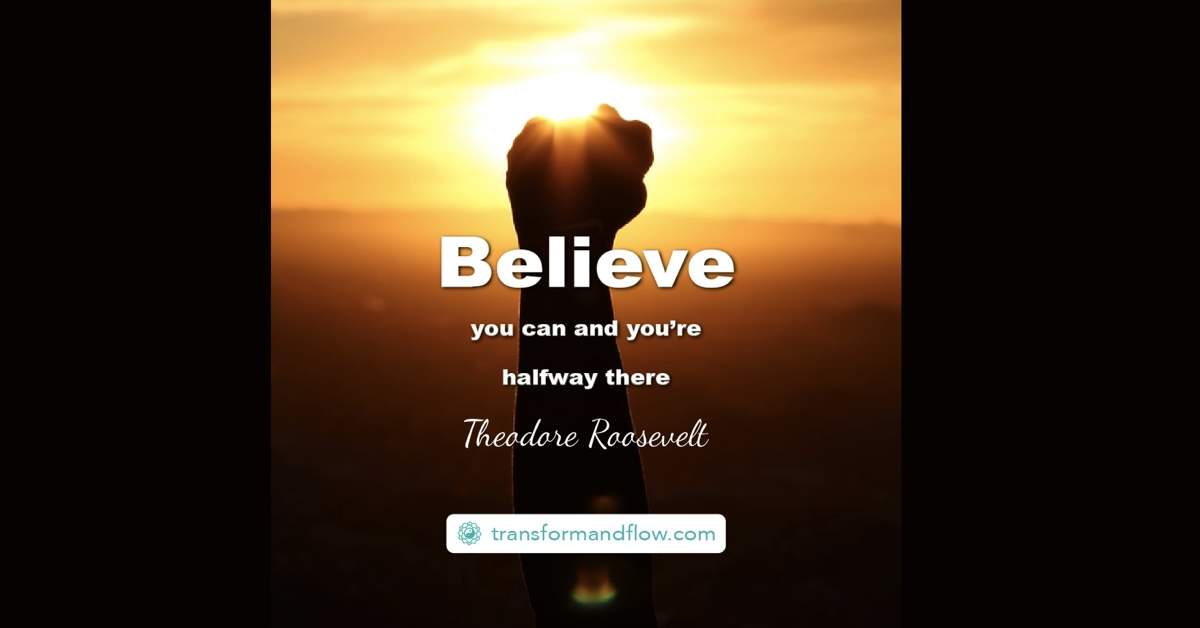Theodore Roosevelt’s timeless adage,
“Believe you can and you’re halfway there,”
isn’t just a motivational platitude; it’s a profound truth about the human psyche and the power of self-belief. It encapsulates the idea that the journey to any significant achievement begins not with physical action, but with a fundamental shift in our internal landscape. It’s about recognizing that the greatest obstacle we often face is not external, but internal—the doubt that whispers insidious limitations into our minds.
This quote serves as a powerful reminder that the first step towards realizing any aspiration is to cultivate an unwavering belief in our own capabilities. When we genuinely believe that we can achieve something, we unlock a reservoir of inner strength and resourcefulness that propels us forward, even in the face of adversity. That initial seed of belief acts as a catalyst, transforming potential into tangible reality.
The concept of “halfway” in this context isn’t a literal measurement of distance but a metaphor for the crucial transition from passive dreaming to active engagement. It signifies the point where we move beyond the realm of wishful thinking and enter the arena of deliberate action. It’s the moment we commit to the journey, acknowledging that the destination is within reach.
The Power of Self-Efficacy:
Roosevelt’s quote aligns closely with the psychological concept of self-efficacy, which refers to an individual’s belief in their ability to succeed in specific situations or accomplish a task. Individuals with high self-efficacy are more likely to set ambitious goals, persevere through challenges, and ultimately achieve their desired outcomes.
When we believe we can, we are more likely to:
- Set Realistic Goals: Belief fuels ambition, but also helps us to set achievable targets.
- Embrace Challenges: Obstacles are viewed as opportunities for growth, not insurmountable barriers.
- Maintain Persistence: Setbacks don’t deter us; they reinforce our determination.
- Cultivate Resilience: We bounce back from failures with renewed vigor.
The absence of self-belief, on the other hand, creates a self-fulfilling prophecy of failure. When we doubt our capabilities, we are more likely to procrastinate, avoid challenges, and give up easily.
The Neuroscience of Belief:
The impact of belief on our actions is not merely psychological; it’s also neurological. Our brains are wired to respond to our thoughts and beliefs. When we believe we can achieve something, our brains release neurotransmitters that enhance motivation, focus, and creativity. This allows us to access our full potential and perform at our best.
Conversely, negative beliefs can trigger the release of stress hormones, which impair cognitive function and hinder our ability to perform effectively. This highlights the importance of cultivating a positive mindset and fostering a belief in our own capabilities.
Beyond Positive Thinking:
It’s important to note that Roosevelt’s quote is not simply advocating for blind optimism. Belief without action is futile. True belief is an active force, a catalyst that propels us towards our goals. It involves:
- Taking Calculated Risks: Belief empowers us to step outside our comfort zones and embrace new opportunities.
- Developing a Plan: Belief provides the motivation to create a roadmap for success.
- Taking Consistent Action: Belief fuels the perseverance needed to overcome obstacles and stay on track.
The Ripple Effect of Belief:
The power of belief extends beyond individual achievement. When we believe in ourselves, we inspire others to do the same. Our confidence becomes contagious, creating a ripple effect of positivity and empowerment.
Conversely, doubt and negativity can also spread like a virus, undermining the confidence of those around us. This highlights the importance of cultivating a positive and supportive environment, where belief in oneself and others is nurtured and encouraged.
Practical Applications:
Roosevelt’s quote can be applied to all aspects of life, from personal goals to professional aspirations. Here are some practical ways to cultivate a belief in your own capabilities:
- Visualize Success: Imagine yourself achieving your goals, visualizing the positive outcomes and feelings of accomplishment.
- Celebrate Small Wins: Acknowledge and celebrate your progress, no matter how small. This reinforces your belief in your ability to succeed.
- Surround Yourself with Positive Influences: Seek out individuals who believe in you and support your aspirations.
- Challenge Limiting Beliefs: Identify and challenge the negative thoughts that hold you back.
- Embrace Mindfulness Techniques: Engage in practices to transcend from the past or current limitations.
- Take Action, Even When You’re Afraid: Don’t wait for perfect conditions; take action now, and learn from your experiences.
Conclusion
Theodore Roosevelt’s quote serves as a powerful reminder that the journey to success begins with a fundamental belief in our own capabilities. By cultivating self-efficacy, embracing challenges, and taking consistent action, we can unlock our potential and achieve our desired outcomes. Remember, believing you can is not just a starting point; it’s the fuel that propels you towards your ultimate destination.
Links
mind.org.uk – How can I improve my self-esteem?


